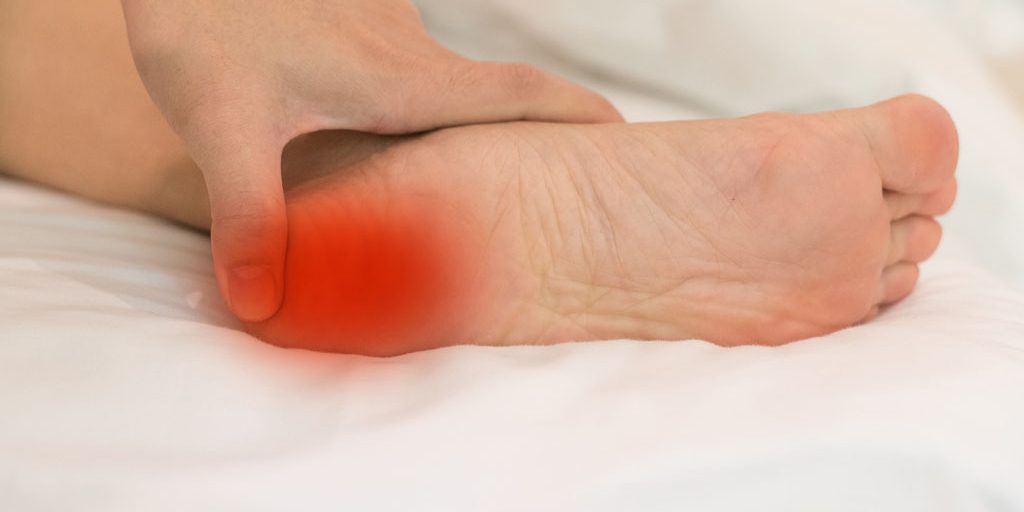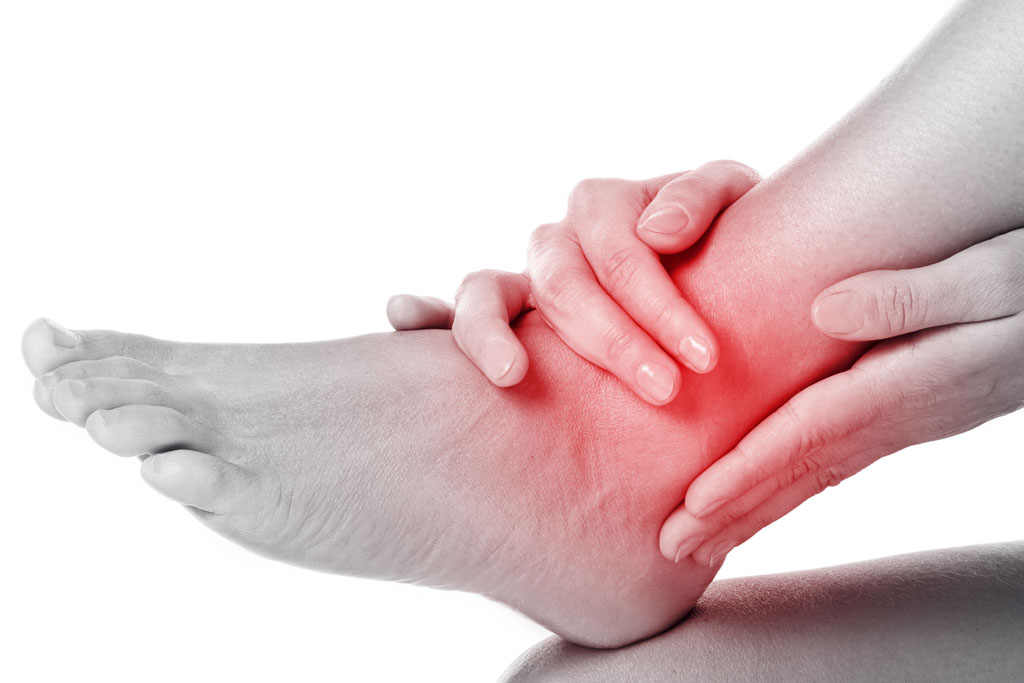Foot pain in the morning is a common health complaint, especially amongst older people. While some cases are mild, it can sometimes be so painful that it stops you from doing day to day tasks, and can make your life more stressful.
If you have sore feet or heel pain after waking, you might find this article useful. We’ll discuss the five most common reasons why you feel pain in your feet in the morning and when you should visit a doctor.
The Four Most Common Causes of Morning Foot Pain:
Plantar Fasciitis
When the tissue that runs along the bottom of your foot becomes inflamed or irritated, it causes a painful condition called plantar fasciitis. People often report stabbing pains when they try to walk in the morning. The pain is usually most severe during the first few steps and decreases as you get on with your day.
There are lots of things that cause plantar fasciitis, such as overuse, tight shoes, or injury.
Plantar fasciitis pain often returns when you move after a long period of inactivity. For example, you may experience sharp or dull pain when you walk after standing still, or when you stand up after sitting for a long time.
In other cases, foot pain due to plantar fasciitis is triggered by prolonged activities like running or stair climbing. Many people report that they experience pain after they stop moving.
Risk Factors
There are several risk factors that can increase your chances of developing plantar fasciitis.
- Plantar fasciitis is most common in middle-aged adults and the elderly.
- If you are on the heavier side, your heels need to endure some extra weight, which can lead to plantar fasciitis.
- People with jobs that involve standing for long periods of time or repetitive motions.
- Those who are active in running and other impact sports.
- People with flat feet.
Remedies and Treatment
If you have plantar fasciitis, there are a number of things you can do to ease the pain. Some home treatments include:
- Stretching exercises
- Over-the-counter pain relievers that can reduce inflammation
- Icing the affected area
If you think you might have plantar fasciitis or there is a rupture in your plantar fascia, the best thing to do is see a podiatrist. They can diagnose the condition and prescribe treatments like physical therapy or custom orthotics that can help alleviate foot and heel pain. In some cases, surgery may be necessary to release the tension in the plantar fascia.
Achilles Tendinitis
The Achilles tendon is the large tendon that runs down the back of your leg and connects your calf muscles to your heel.
This tendon can become inflamed or irritated in a condition known as Achilles tendinitis. This often causes pain and foot stiffness in the morning when you first get out of bed.
A person with Achilles tendinitis can experience pain on the tendon itself or at the edge of the heel bone at what we call the tendon insertion area.
Other common symptoms include:
- Difficulty flexing your foot or pointing your toes
- Swelling or tenderness in the Achilles tendon
- Warmth around the heel or Achilles tendon
- Leg weakness
Risk Factors
Certain factors can increase your chances of developing Achilles tendinitis.
- Achilles tendonitis is more common amongst older people.
- Medical conditions like obesity, psoriasis, and high blood pressure.
- Cold Weather. Pain from tendinitis is usually more severe when the temperature is low.
Remedies and Treatment
If you have Achilles tendinitis, there are a number of things you can do to ease the pain and speed up the healing process:
- Prolonged Rest. Avoid any activity that puts stress on your tendon for a few weeks. Enough rest will give the inflamed tendon time to heal.
- Ice Treatment. Apply ice to the affected area for 20 minutes three times per day to help reduce swelling and pain.
- Compression Wrap. Use an elastic compression wrap or wear a walking boot to help decrease swelling and support the tendon and foot.
- Foot Elevation. Elevate your foot as much as possible to decrease blood flow and swelling in the area.
- Stretching. Once the pain and inflammation have gone down, slowly start doing stretching and strengthening exercises to help relax the calf muscle. These will also improve flexibility, range of motion, and strength in the Achilles tendon area.
Tendon pain from Achilles tendinitis is different from the pain a person experiences when the tendon tears from the heel bone. If you think you might have Achilles tendinitis, it’s important to see a , who will be able to develop a personal treatment plan.
Arthritis
Osteoarthritis and rheumatoid arthritis are common types of arthritis. Both can cause foot pain in the morning. Osteoarthritis is a disease that breaks down the cartilage in your joints. Rheumatoid arthritis is an inflammatory disease that causes the lining of your joints to swell.
Symptoms of rheumatoid arthritis typically include foot pain and stiffness, redness and swelling, and limited joint movement when pain persists.
Risk Factors
There are several risk factors for arthritis, including:
- Obesity
- Pre-existing injuries
- Old age
- Having a genetic predisposition
Remedies and Treatment
When your feet hurt because of rheumatoid arthritis, there are several things you can do for temporary relief. You might consider:
- Taking pain relievers such as ibuprofen or aspirin
- Applying heat or cold ice to the affected area
- Gentle stretching exercises like ankle circles, leg swings, arch stretches, and knee hugs
- Wearing proper footwear. This might include buying shoes with a wide or big toe design, shoes that have good arch support, shoes with a cushioned sole, or shoe inserts. Ill-fitting shoes can contribute to joint pain and foot stiffness.
- Resting your feet and giving them a massage. Lotions or oils can help with this.
While there is no permanent cure for rheumatoid arthritis, there are treatments that can help you deal with pain. These include guided exercise from a physical therapist, weight loss, and other forms of medication. Surgery is only recommended in very severe cases.
Hypothyroidism
Hypothyroidism is a condition where the thyroid gland doesn’t produce enough hormones. This can result in something called myxedema, a condition that causes dry and thick skin, sometimes in the feet. The skin on your feet can become so thick that it starts to crack and become very painful.
In a condition called tarsal tunnel syndrome, this thick skin can also put pressure on a part of your foot called the tarsal tunnel, a small space containing lots of nerves and blood vessels, causing pain.
Risk factors
There are several factors that contribute to hypothyroidism:
- Hypothyroidism is more common in females
- Family history of hypothyroidism or autoimmune diseases
- Exposure from radiation therapy to the head or neck area
Other symptoms of hypothyroidism include fatigue, weakness, weight gain, hair loss, muscle stiffness, and constipation.
Remedies and Treatment
Fortunately, there are several things you can do at home to treat and prevent foot pain caused by hypothyroidism:
- Pay attention to your diet and eat healthy foods
- Lose weight
- Perform low-intensity exercises like simple aerobics, walking, and swimming
- Properly rest your feet before soaking in warm water for 20 minutes
If you have any symptoms of hypothyroidism, it is important to see your doctor as early as possible so they can do a blood test to check your thyroid hormone levels.
If the test shows that you do have an underactive thyroid gland, there is no need to worry. There are a lot of treatment options as hypothyroidism is easily treated with medication.
Helpful Tips and When to Visit a Doctor
If you are an active athlete and have a foot injury, you can find help from
a sports medicine specialist. But for many of us, sore feet in the morning are not a result of physical strain or injury and for most people, foot pain can be severe and last for a long time.
If you cannot walk or put weight on one foot without pain, even after two weeks of rest and home treatment, you should see a doctor.
When you think you have a foot disorder, it’s best to consult with a foot and ankle specialist. While plantar fasciitis or Achilles tendinitis are amongst the most common causes of sore feet in the morning, this is not the case for everyone.
Medical attention should be given to finding the root cause of your problem. Only then can a specialist create a specific treatment plan for you.






